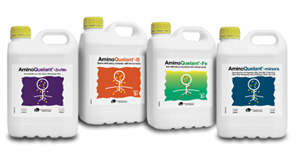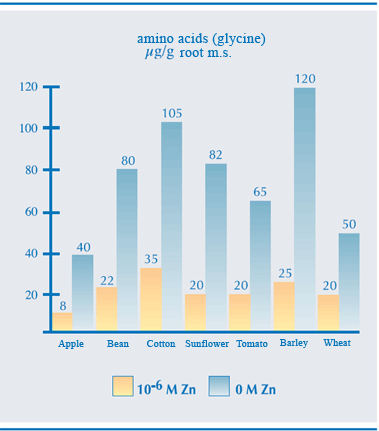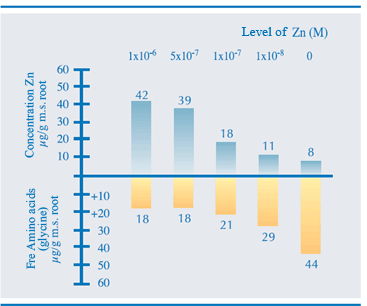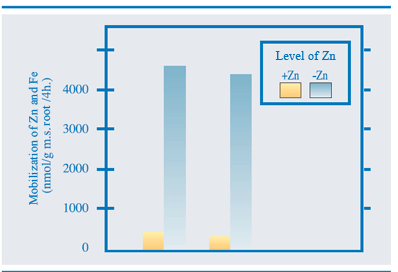Root Exudation of amino acids as a reaction to states of deficiency
It is a well-know fact that plants cultivated under conditions of lack of nutrients increase the secretion of root exudates in order to liberate the nutrients needed by the plant

The authors of this study analysed the reaction (at the level of root exudates) to a nutritional deficiency in zinc. It was observed that a deficiency in zinc forces the plant to exude amino acids, as well as sugars and phenols.
The test was carried out with young plants of the following species:
- Apple (Malus sylvestris domestic variety)
- Bean (Phaseolus vulgaris L. cv. Prelude)
- Cotton (Gossypium hirsutum L.cv. Deltapine 15/21)
- Sunflower (Helianthus annuus L. cv. Sorex)
- Tomato (Lycopersicon esculentum Mill. cv. Super Marmande)
- Barley (Hordeum vulgare L. cv. Europa)
- Wheat (Triticum aestivum L. cv. Ares)
Plants were cultivated in a controlled environment chamber with regulated temperature, humidity, and light. Plants were fed with a complete nutritive solution which included a ZnSO4concentration of 10-6 M for zinc-fertilized plants, and 0M for plants developed with zinc deficiency.
In Graphic 1 we can see the results of the analysis of exudates of the different species, with and without zinc fertilization. In all of them it can be clearly observed an increment in the exudation of amino acids when plants develop with zinc deficiency. This increment ranges between 300 to 400%.

In this part we present the second part of this study. It analyses the level of amino acid exudation depending on the level of zinc deficiency.
Moreover, the study investigated the mobilization capability of root exudates formed by iron and zinc coming from non soluble sources of these elements (synthetic resin for Zinc, ferric hydroxide for Iron). The study confirmed that this mobilization capability is highly enhanced by the aforementioned exudates.

Graphic 2. Effects of giving providing zinc to the plant in the root exudation of amino acids. 25-days-old wheat plant.

Graphic 3. Capability of mobilization of zinc and iron in the root exudates depending on the plant zinc nutritional level. 25-days-old wheat plant.